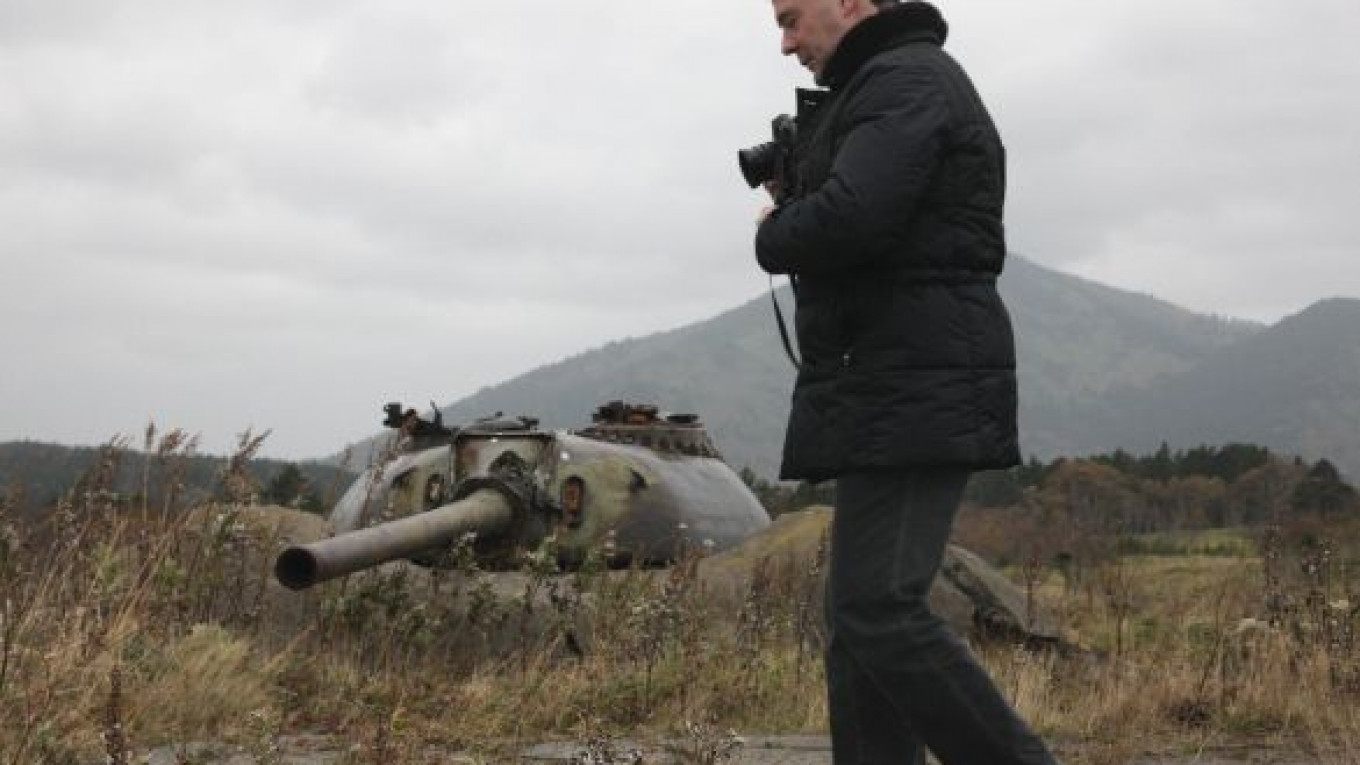President Dmitry Medvedev became on Monday the first leader of modern Russia to visit the disputed Kuril Islands, where he toured local facilities, shopped for fish and snacked on a slice of bread spread with butter and red caviar in front of the cameras.
Japanese officials protested the landmark visit and even hinted that Tokyo's ambassador to Moscow might be recalled.
Russian officials brushed off the protests, reaffirming the tough position that Moscow has taken on its 50-year territorial dispute over the islands, ahead of a Group of 20 meeting in Seoul next week.
"Japan's stance is that those four northern islands are part of our country's territory, so the president's visit is very regrettable," Japanese Prime Minister Naoto Kan told a parliamentary panel about Medvedev's trip, news reports said.
Japanese Foreign Minister Seiji Maehara said the visit “hurt the feelings of the Japanese people” and summoned Russia's ambassador to Japan, Mikhail Bely, to express Tokyo's dismay.
But Foreign Minister Sergei Lavrov said the Japanese “demarche” was “unacceptable,” according to a ministry statement.
Lavrov played down the trip Saturday, saying it was not politically charged because the president was traveling within Russia's territory.
A spokesman for the Japanese Embassy in Moscow declined to comment Monday, saying all statements were being made in Tokyo.
Medvedev stopped by Kunashir Island while returning from a two-day visit to Vietnam. Kunashir is part of a four-island range, called the South Kurils in Russia and the Northern Territories in Japan, and contested by both countries for years.
Medvedev, accompanied by Sakhalin Governor Alexander Khoroshavin, visited a geothermal power station, a fishery plant and an Orthodox church during his visit of only a few hours.
“Delicious,” Medvedev said in televised remarks as he ate the caviar-smeared bread at the fishery plant.
Khoroshavin told him that the plant, which produces 110 tons of fish products a day, has “certain difficulties” shipping its goods to the mainland, and the president promised to order a check of the situation, the Kremlin said on its web site.
Medvedev, dressed in black jeans, a blue buttoned-down shirt and a black coat, also drank tea with a local family in their newly constructed apartment building.
“I won't hide the fact that we are interested in people staying and living here,” the president told the family.
About 19,000 people live on the Kurils, some 6,300 of them on Kunashir.
Medvedev, an amateur photographer, also took some photos of the island's landscapes, later posting them on his Twitter blog.
Winding up the trip, he visited a local store, where he shelled out 475 rubles ($15.30) for some smelt, a small, silvery fish.
“A better life will come here — like in central Russia,” Medvedev told journalists at a new kindergarten, Interfax reported.
The islands are surrounded by rich fishing waters and are believed to have offshore oil and natural gas reserves, as well as gold and silver deposits. The Soviet Union seized them during World War II, and the dispute has prevented the signing of a peace treaty with Japan formally ending the war.
Russia proposed to return two of the islands in the mid-2000s, but the offer was rejected by Japan, which is adamant in its demand to get all four islands.
This is not the first time that a Russian official has prompted a diplomatic spat with Japan by traveling to the Kurils. In 2007, a visit by Lavrov triggered a similar reaction.
Nevertheless, the latest quarrel is unlikely to harm relations between Russia and Japan, said Yevgeny Bazhanov, vice chancellor of research and international relations at the Foreign Ministry’s Diplomatic Academy in Moscow.
He said relations are “better than ever” because of a thriving economic partnership and similar political positions on foreign affairs.
He said the visit was made with the local population, not Japanese diplomats, in mind.
“Medvedev wanted to show that those distant regions are not forgotten, and they plan to develop them,” Bazhanov said by telephone.
In a sign of Japan's importance to the islands, Medvedev conducted his tour in a Japanese-made Nissan Patrol.
A Message from The Moscow Times:
Dear readers,
We are facing unprecedented challenges. Russia's Prosecutor General's Office has designated The Moscow Times as an "undesirable" organization, criminalizing our work and putting our staff at risk of prosecution. This follows our earlier unjust labeling as a "foreign agent."
These actions are direct attempts to silence independent journalism in Russia. The authorities claim our work "discredits the decisions of the Russian leadership." We see things differently: we strive to provide accurate, unbiased reporting on Russia.
We, the journalists of The Moscow Times, refuse to be silenced. But to continue our work, we need your help.
Your support, no matter how small, makes a world of difference. If you can, please support us monthly starting from just $2. It's quick to set up, and every contribution makes a significant impact.
By supporting The Moscow Times, you're defending open, independent journalism in the face of repression. Thank you for standing with us.
Remind me later.






